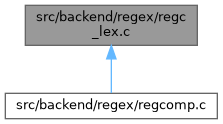
Go to the source code of this file.
Macros | |
| #define | ATEOS() (v->now >= v->stop) |
| #define | HAVE(n) (v->stop - v->now >= (n)) |
| #define | NEXT1(c) (!ATEOS() && *v->now == CHR(c)) |
| #define | NEXT2(a, b) (HAVE(2) && *v->now == CHR(a) && *(v->now+1) == CHR(b)) |
| #define | NEXT3(a, b, c) |
| #define | SET(c) (v->nexttype = (c)) |
| #define | SETV(c, n) (v->nexttype = (c), v->nextvalue = (n)) |
| #define | RET(c) return (SET(c), 1) |
| #define | RETV(c, n) return (SETV(c, n), 1) |
| #define | FAILW(e) return (ERR(e), 0) /* ERR does SET(EOS) */ |
| #define | LASTTYPE(t) (v->lasttype == (t)) |
| #define | L_ERE 1 /* mainline ERE/ARE */ |
| #define | L_BRE 2 /* mainline BRE */ |
| #define | L_Q 3 /* REG_QUOTE */ |
| #define | L_EBND 4 /* ERE/ARE bound */ |
| #define | L_BBND 5 /* BRE bound */ |
| #define | L_BRACK 6 /* brackets */ |
| #define | L_CEL 7 /* collating element */ |
| #define | L_ECL 8 /* equivalence class */ |
| #define | L_CCL 9 /* character class */ |
| #define | INTOCON(c) (v->lexcon = (c)) |
| #define | INCON(con) (v->lexcon == (con)) |
| #define | ENDOF(array) ((array) + sizeof(array)/sizeof(chr)) |
Functions | |
| static void | lexstart (struct vars *v) |
| static void | prefixes (struct vars *v) |
| static int | next (struct vars *v) |
| static int | lexescape (struct vars *v) |
| static chr | lexdigits (struct vars *v, int base, int minlen, int maxlen) |
| static int | brenext (struct vars *v, chr c) |
| static void | skip (struct vars *v) |
| static chr | newline (void) |
| static chr | chrnamed (struct vars *v, const chr *startp, const chr *endp, chr lastresort) |
Macro Definition Documentation
◆ ATEOS
Definition at line 36 of file regc_lex.c.
◆ ENDOF
Definition at line 64 of file regc_lex.c.
◆ FAILW
Definition at line 47 of file regc_lex.c.
◆ HAVE
Definition at line 37 of file regc_lex.c.
◆ INCON
| #define INCON | ( | con | ) | (v->lexcon == (con)) |
Definition at line 61 of file regc_lex.c.
◆ INTOCON
Definition at line 60 of file regc_lex.c.
◆ L_BBND
Definition at line 55 of file regc_lex.c.
◆ L_BRACK
Definition at line 56 of file regc_lex.c.
◆ L_BRE
Definition at line 52 of file regc_lex.c.
◆ L_CCL
Definition at line 59 of file regc_lex.c.
◆ L_CEL
Definition at line 57 of file regc_lex.c.
◆ L_EBND
Definition at line 54 of file regc_lex.c.
◆ L_ECL
| #define L_ECL 8 /* equivalence class */ |
Definition at line 58 of file regc_lex.c.
◆ L_ERE
◆ L_Q
Definition at line 53 of file regc_lex.c.
◆ LASTTYPE
| #define LASTTYPE | ( | t | ) | (v->lasttype == (t)) |
Definition at line 48 of file regc_lex.c.
◆ NEXT1
◆ NEXT2
Definition at line 39 of file regc_lex.c.
◆ NEXT3
Definition at line 40 of file regc_lex.c.
◆ RET
◆ RETV
◆ SET
Definition at line 43 of file regc_lex.c.
◆ SETV
Definition at line 44 of file regc_lex.c.
Function Documentation
◆ brenext()
Definition at line 861 of file regc_lex.c.
References assert, ATEOS, BACKREF, vars::cflags, CHR, DIGITVAL, EMPTY, FAILW, HAVE, INTOCON, iscalnum, L_BBND, L_BRACK, LASTTYPE, NEXT1, NEXT2, NOTE, NOTREACHED, vars::now, PLAIN, REG_EESCAPE, REG_EXPANDED, REG_UBACKREF, REG_UBOUNDS, REG_UBSALNUM, REG_UNONPOSIX, REG_UUNSPEC, RET, RETV, and skip.
Referenced by next().
◆ chrnamed()
|
static |
Definition at line 1022 of file regc_lex.c.
References cvec::chrs, element(), vars::err, errsave, fb(), cvec::nchrs, and range().
Referenced by lexescape().
◆ lexdigits()
Definition at line 780 of file regc_lex.c.
References ATEOS, CHR, DIGITVAL, ERR, fb(), len, vars::now, and REG_EESCAPE.
Referenced by lexescape().
◆ lexescape()
Definition at line 601 of file regc_lex.c.
References assert, ATEOS, BACKREF, CC_DIGIT, CC_SPACE, CC_WORD, CCLASSC, CCLASSS, vars::cflags, CHR, CHR_IS_IN_RANGE, chrnamed(), ENDOF, FAILW, fb(), ISERR, lexdigits(), NOTE, NOTREACHED, vars::now, NWBDRY, PLAIN, REG_ADVF, REG_EESCAPE, REG_UBACKREF, REG_ULOCALE, REG_UNONPOSIX, REG_UUNPORT, RET, RETV, SBEGIN, SEND, and WBDRY.
Referenced by next().
◆ lexstart()
Definition at line 70 of file regc_lex.c.
References assert, vars::cflags, EMPTY, INTOCON, L_BRE, L_ERE, L_Q, next, vars::nexttype, NOERR, prefixes(), REG_ADVANCED, REG_ADVF, REG_EXPANDED, REG_EXTENDED, REG_NEWLINE, and REG_QUOTE.
◆ newline()
◆ next()
Definition at line 200 of file regc_lex.c.
References assert, ATEOS, brenext(), CCLASS, CCLASSC, CCLASSS, vars::cflags, CHR, COLLEL, DIGIT, DIGITVAL, ECLASS, EMPTY, END, EOS, FAILW, fb(), HAVE, INCON, INTOCON, iscalnum, iscdigit, ISERR, L_BBND, L_BRACK, L_BRE, L_CCL, L_CEL, L_EBND, L_ECL, L_ERE, L_Q, LACON, LASTTYPE, vars::lasttype, LATYPE_AHEAD_NEG, LATYPE_AHEAD_POS, LATYPE_BEHIND_NEG, LATYPE_BEHIND_POS, vars::lexcon, lexescape(), NEXT1, vars::nexttype, NOTE, NOTREACHED, vars::now, PLAIN, RANGE, REG_ADVF, REG_BADBR, REG_BADRPT, REG_BOSONLY, REG_EBRACE, REG_EBRACK, REG_EESCAPE, REG_EXPANDED, REG_EXTENDED, REG_UBBS, REG_UBOUNDS, REG_UBRACES, REG_UBSALNUM, REG_ULOCALE, REG_ULOOKAROUND, REG_UNONPOSIX, REG_UUNSPEC, RET, RETV, SBEGIN, and skip.
◆ prefixes()
Definition at line 99 of file regc_lex.c.
References ATEOS, vars::cflags, CHR, ERR, fb(), HAVE, iscalpha, NEXT1, NEXT2, NEXT3, NOTE, vars::now, REG_ADVANCED, REG_ADVF, REG_BADOPT, REG_BADPAT, REG_BADRPT, REG_EXPANDED, REG_EXTENDED, REG_ICASE, REG_NEWLINE, REG_NLANCH, REG_NLSTOP, REG_QUOTE, and REG_UNONPOSIX.
Referenced by lexstart(), and NIImportAffixes().
◆ skip()
Definition at line 982 of file regc_lex.c.
References assert, ATEOS, vars::cflags, CHR, iscspace, NEXT1, NOTE, vars::now, REG_EXPANDED, REG_UNONPOSIX, and start.